Everything You Need to Know About Baby-Led Weaning: A Safe Approach to Starting Solid Foods
- How baby-led weaning is different from spoon-feeding and what research supports it
- Who started baby-led weaning and why you should read the original book by Gill Rapley
- What benefits your baby (and you!) get from this natural approach to starting solid foods
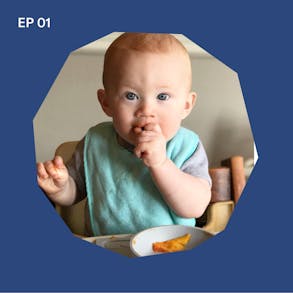
LISTEN TO THIS EPISODE
Episode Description
Welcome to the Baby-Led Weaning with Katie Ferraro podcast! In this kickoff episode we’re diving into all things baby-led weaning. Learn how baby-led weaning differs from adult spoon-feeding and what research supports it. Discover the origins of baby-led weaning including insights from Gill Rapley, the co-author of the original baby-led weaning book. We’ll explore the benefits - and the challenges - of this natural approach to starting to solid foods so you can determine whether or not baby-led weaning will work for your family.

Links from This Episode
- Gill Rapley’s Baby-Led Weaning book: Baby-Led Weaning The Essential Guide (get the 2019 revised 10th anniversary edition - linking on amazon here, this is an affiliate link).
- Baby-Led Weaning with Katie Ferraro program with the 100 First Foods™ Daily Meal Plan, join here: https://babyledweaning.co/program
- Baby-Led Weaning for Beginners free online workshop with 100 First Foods™ list to all attendees, register here: https://babyledweaning.co/baby-led-weaning-for-beginners
If you want to learn more about Gill Rapley, take a listen to these interview episodes I have done with her:
- Episode 100 - The History of BLW with its Founding Philosopher Gill Rapley, PhD (Part 1)
- Episode 102 - The Future of BLW with its Founding Philosopher Gill Rapley, PhD (Part 2)
- Episode 140 - National Baby-Led Weaning Day: It's a Thing with Gill Rapley, PhD
- Episode 142 - Debunking the Biggest BLW Myths with Gill Rapley, PhD
- Episode 200 - Combo Feeding: Can I Do BLW + Traditional Spoon-Feeding Together? with Gill Rapley, PhD
- Episode 241 - How did Baby-Led Weaning Get its Name? with Gill Rapley, PhD
- Episode 260 - Adapted Baby-Led Weaning for Children with Developmental Delays with Gill Rapley, PhD and Jill Rabin, MS, CCC-SLP/L, IBCLC
Other Episodes Related to This Topic
- Episode 201 - Order of BLW Foods to Feed: Does it Matter? at https://babyledweaning.co/podcast/201
- Episode 211 - How to Schedule Milk Feeds with Solid Food for Baby-Led Weaning at https://babyledweaning.co/podcast/211
- Episode 241 - How did Baby-Led Weaning Get its Name? with Gill Rapley, PhD https://babyledweaning.co/podcast/241
- Episode 249 - BLW Feeding Schedule: First 10 Days of Baby-Led Weaning https://babyledweaning.co/podcast/249
- Episode 255 - 5 Things I Would Do Differently if I Started BLW All Over Again https://babyledweaning.co/podcast/255

Latest Episodes
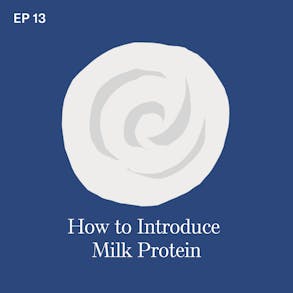
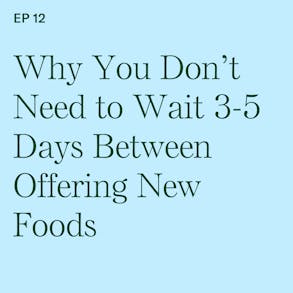
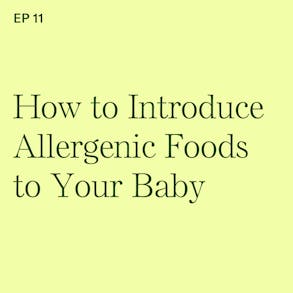
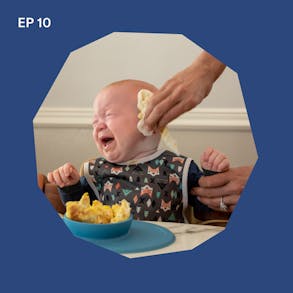
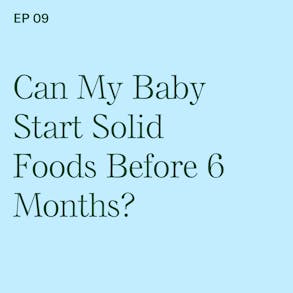
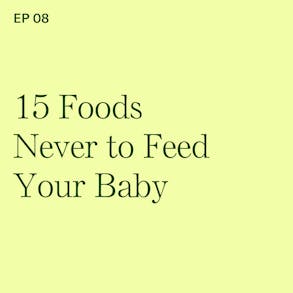
Katie Ferraro (0s):
As parents and caregivers, we sometimes get so hung up on what or how much our babies are eating that we forget from six to 12 months of age, this is the practice period where we should be teaching our babies how to eat. Well, baby-led weaning lets you do just that. Hey there, I'm Katie Ferraro, Registered Dietitian, college nutrition professor, and mama of seven specializing in baby-led weaning. Here on the Baby-Led Weaning Made Easy podcast I help you strip out all of the noise and nonsense about feeding, leaving you with the competence and knowledge you need to give your baby a safe start to solid foods using baby-led weaning.
Katie Ferraro (46s):
Hello and welcome. Welcome to the very first episode of the Baby-Led Weaning Made Easy podcast. I'm your host, Katie Ferraro. And we are really starting at the beginning today. We're going to be talking about what exactly is baby-led weaning. Like how do you get your baby to eat real wholesome foods from his or her first bites? And how do you do that safely? So in today's episode, I'll tell you a little bit about the history of this feeding philosophy, just to kind of set the stage, but you also need to know what you can expect to get out of your decision to go this route, to feed your baby because there's actually a lot in it for you as the parent or the caregiver too.
Katie Ferraro (1m 28s):
I'll tell you how I personally became devoted to this approach to starting solids. It starts out with me being an utter disaster when I tried to spoonfeed my oldest daughter, but then how baby-led weaning helped us turn things around as a family and really brought the fun back into family mealtimes because I believe feeding your baby should be fun. We're going to be talking a little bit though also about what baby-led weaning is not just to set the record straight and hang tight because I'm going to be sharing a quick win with you guys. That's going to help you out during the first few weeks of baby-led weaning. Like when you feel like you want to quit, because you're not sure if you're doing this baby feeding thing, right?
Katie Ferraro (2m 9s):
I will tell you the secret to pushing past those first few frustrating feedings with your baby. So let's go ahead and get started talking about what is baby-led weaning now as a Registered Dietitian and a college nutrition professor who specializes in baby-led weaning as well as a mom who's done this approach with six of my seven kids, I like to describe baby-led weaning as a practical, safe hands on approach to starting solid foods. Baby-led weaning is an alternative to traditional spoon-feeding. And when I say traditional spoon-feeding, I'm talking about that age old image of starting solids. You know the one where the mom or the dad is putting pureed foods on a spoon and then trying to get the baby who is generally disinterested or disgusted, sometimes forcefully they're to get the baby to eat that pureed food.
Katie Ferraro (3m 2s):
But you guys, there is another way to feed a baby and babies can do a lot more than we give them credit for. Babies who are six months of age or older plus exhibiting the other signs of readiness to feed - they can learn to love to feed themselves safe age appropriate foods provided by, but not necessarily forced fed by you, the parent or the caregiver. So this alternative to traditional spoon-feeding baby-led weaning, It's where the baby is in control of eating. So it's not us forcing or coercing or manipulating our babies to eat. And if you think about it, baby-led weaning this whole approach to feeding, It's really a centuries old natural approach to letting your baby sell feed.
Katie Ferraro (3m 48s):
I mean, I always wonder like what in the world did cave mama do back in the day prior to the advent of commercial baby food or puffs or pouches, right? She probably let her baby eat real food. That's kind of the crux of baby-led weaning, but there's a lot of nuance in the details on how to do this safely. And that's something I really focus on in this podcast and in my work in baby-led weaning, it's about how to give your baby a safe start to solid foods using baby-led weaning because any food, if it's fed unsafely can be dangerous. So we need to focus on the safety part of it. I mentioned how it's kind of an centuries-old approach rather to letting your baby self-feed foods you might be wondering, well then why am I only hearing about this baby led weaning thing now?
Katie Ferraro (4m 34s):
So as a term goes, the term baby-led weaning was coined by Gill Rapley, the coauthor of the original baby-led weaning book. She was researching self-feeding among babies and ended up calling this idea, baby led weaning. So Dr. Rapley, who has a PhD and who has studied infant feeding and child development, she co-wrote her baby-led weaning book, which was originally published in 2008. Now it's since been updated and expanded in a 10th anniversary edition. And I highly recommend that you read this book, it's called baby-led weaning the essential guide, it's by Rapley and Marquette. And it will really help you get an understanding of the philosophy behind how babies can learn to self feed and why they should be able to do that versus us trying to force feed them.
Katie Ferraro (5m 24s):
So what I love about baby-led weaning is that it really is a philosophy as well as a practice that addresses not just what your baby eats, but really it's more about letting the baby learn how to eat. And I know personally, as parents and caregivers, we sometimes get just so hung up on what and how much our babies are eating. That we really forget the bigger picture, which is this whole period from six to 12 months or so. It's about letting our babies learn how to eat and giving them that permission to practice. Our goal ultimately is to have your baby sitting at the table, eating modified versions of the same foods that the rest of the family does by the time your baby turns one, but you know what, your baby doesn't just magically wake up on his or her first birthday and know how to do all of this eating stuff, right?
Katie Ferraro (6m 14s):
That's why we start practicing at around six months of age when it comes to the evidence and the research to back up and support baby-led weaning. And I'll go through all of that in this podcast with you. My show notes will always have links to the research that we're talking about. It is a safe and effective feeding method and the research it's really bears that out. It's actually a really exciting time for us to be working in this field, but also for you to be raising an independent eater. And that's because there is a real, incredible body of research and evidence that supports baby led weaning as a viable and safe alternative to traditional spoon-feeding. We know from the research that babies who are exposed to the greatest number of foods and flavors and tastes and textures early and often, those babies are more likely to become independent eaters and they're less likely to be picky eaters.
Katie Ferraro (7m 5s):
So I want to tell you guys a quick story about how I became a huge devotee of baby-led weaning, and why I actually ended up shifting the entire focus of my nutrition career to help other parents and caregivers learn how to do baby-led weaning safely. I mentioned at the top, I think I did, I have seven children and when my oldest daughter Molly was starting solid foods, it did not go well. Like I can say this now, but I was at the time I was so embarrassed. Molly really hated being spoonfed. I was doing what my pediatrician said. I now know I started too early. She wasn't ready. I did everything wrong. And I'm fine sharing that with you guys now, but let me just say Molly really hated being spoonfed. And at the time mealtimes would just quickly devolved into this downright battleground.
Katie Ferraro (7m 49s):
I couldn't get Molly to eat. And I felt like a total failure as a parent because what kind of, if mom can't feed her baby and then like what kind of dietitian mom on top of that, I felt awful. And I even remember this one time, I was basically trying to force feed Molly to eat these stupid purees that I had frozen. And my mom called. She's also a dietitian and a mom of six kids. And then my sister who herself has six kids. They invited me to go on a play date around lunchtime and I totally lied and said, I couldn't go. Not that I didn't want to, but that I just didn't want to have to be around them and have them see, especially at mealtime, how I couldn't feed my own daughter when it was time to eat.
Katie Ferraro (8m 32s):
And I mean, I, I really did not like feeding Molly. I was super frustrated and I just felt like a failure as a parent. So of course, right around this time, my husband and I found out that I was pregnant with quadruplets. So we had been doing fertility treatments. I knew that the odds of like a multiples pregnancy was out there, but I was not expecting quadruplets. And I remember the first thing that I thought when I saw the four little blips on the ultrasound was how am I going to feed these four babies at once? If I can't even feed them one baby I have at home right now, I ended up having what eventually were three healthy boys and a healthy girl born at 34 weeks. And our quadruplets spent some time in the NICU growing.
Katie Ferraro (9m 14s):
And if you've ever spent time in the NICU, you may remember there's a lot of downtime. So I was feeling so dejected about feeding Molly back at home, like to the point where I would do anything to skip meal time, I'd be like, okay, what else? Feed her? I'll stay at the NICU. But I did kind of throw myself into researching what I could do to help him prove the feeding situation back at home. Like were I to ever go back there because Molly was basically boycotting one of my spoonfeeding attempts. So this colleague had told me about this thing called baby-led weaning. And again, college nutrition professor taught nutrition throughout the life cycle for years. Never even heard of it. Yeah. Remember this colleague saying, you know, it's kind of a thing that you're starting to hear more about it, but when you, you start to use and learn about baby-led, weaning, you'll instantaneously see a huge difference in how your baby starts loving all types of food and you're going to stop dreading mealtimes.
Katie Ferraro (10m 5s):
And by the way, it also helps prevent picky eating. So what I kind of realized through there are learning and doing more research is that me and limiting Molly to spoon-feeding only purees that were fed by me was really taking away her ability and desire to learn how to enjoy eating. And that baby led weaning was something that could actually bring it back. So yeah, rather than feeling sorry for myself, about my older baby, that wouldn't eat and my little four babies that were in the NICU. I threw myself into learning everything I could about this baby led weaning thing. I read all of the research speaking with all of the experts in my field, because even though the quadruplets were still only weeks old, I was convinced that when it was time for the quads to eat, we were going to start out on the right foot and I wasn't going to recreate the painful introduction to solids that I had had from spoonfeeding, Molly.
Katie Ferraro (10m 54s):
This time I was determined to use baby-led weaning to help create a fun and enjoyable approach to family meals rather than battling it out with five babies rejecting my food. So it's safe to say that during those first few weeks and months of the quadruplets live, I became obsessed about baby-led weaning. I reviewed and read every peer reviewed, published article on the topic. I could get my hands on it, talking to the experts, needing to know that this was really a safe place, legitimate way to start solid foods. Like I was not like I needed to be with something that was backed up by the evidence, not some flash in the pan woo woo parenting technique that would be like here today, gone tomorrow. This is serious stuff, right? Like how our kids learned to have a relationship with food.
Katie Ferraro (11m 36s):
But I have to say that when the quadruplets were finally ready to eat, baby-led weaning really was the godsend that I had hoped it would be for my family. Whereas I had struggled so much with spoonfeeding Molly with the quads I went a totally different route and different direction with baby-led weaning. My quad started eating real wholesome foods from the time they were six months adjusted age and they've been feeding themselves ever since. By the time they turned one, the quadruplets had each tried over 100 different foods. And so throughout this time I was documenting it and sharing it on social media and beginning to write and speak about how this was such a more positive experience for introducing foods.
Katie Ferraro (12m 18s):
Like it literally made feeding for babies at once not only feasible but fun. It was so enjoyable. And since that time, our family expanded by one more set of multiples. We wanted that one final baby. We go, we have twins, baby twins, Gus and Hannah. Some of you guys may know them from my Instagram page at baby-led weaning team, which is where I really honed my whole 100 First Foods approach to start solids with baby-led weaning. I actually started that Instagram when Gus and Hannah started solids, I didn't want to be spamming my main page. And I wanted to be documenting everything about the first 100 Foods that they were eating as I was refining this approach. And I know that so many of you guys have followed the same feeding framework to help your babies eat 100 foods before turning one.
Katie Ferraro (13m 4s):
And if you're just starting out, I will help you get your baby to that really important benchmark of 100 Foods before the baby turns one. And I am so convinced that baby-led weaning is the best way to raise an independent eater to the point that I shifted the focus of my nutrition practice. And I now work exclusively in baby-led weaning. So hence the podcast Baby-Led Weaning Made Easy now through my courses and workshops and trainings I've had the opportunity to help tens of thousands of families and caregivers give their babies a safe start to solid foods. I also want extensively with doctors and dietitians and other health care workers, as well as childcare providers to teach them how to give babies a safe start to solid foods using baby-led weaning.
Katie Ferraro (13m 50s):
So since I get asked probably every day, what exactly is baby-led weaning? Cause it's kind of a weird term. If you're not familiar with the mechanics of weaning and we'll get into that in the podcast. But I like to summarize baby-led weaning by saying it is a practical, safe hands on approach to starting solid foods. Baby-led weaning is an alternative to traditional spoon-feeding. Now spoons are not outlawed on this podcast. I will teach you how you can incorporate spoon-feeding for naturally pureed foods. But the kicker is it's all about letting the baby drive the spoon. I'll show you the preloaded spoon technique. You don't have to do the work. The baby does it. Baby-led weaning helps you raise an independent eater.
Katie Ferraro (14m 32s):
Baby-led weaning helps you prevent picky eating. And I think most importantly, above all baby-led weaning allows your baby to develop a healthy relationship with food, because I don't know exactly where you're at in your parenting journey right now, but many of us are working to improve our own relationships with food. At the same time that we're trying to teach our children how to have a healthy relationship with food. So maybe we ourselves are a picky eater or maybe I don't have the best relationship with food, or maybe my partner isn't on board with teaching the baby, how to self feed. One of the things that a colleague of mine, Dr. Julia Norgen says, she's a pediatrician and I love this line.
Katie Ferraro (15m 13s):
She says, you are writing your family's food story. Your baby's a blank slate. The story hasn't started yet. Your family story does not have to end up with you having a picky eater who will only eat like dinosaur shaped chicken nuggets, right? You are writing your family's food story. And I think a great place to start is with baby-led weaning this approach that helps your baby get a safe start to solid foods and build a huge repertoire of foods and flavors and tastes and textures. That will be the foundation of his or her future healthy relationship with food. I am so excited to share all of these safe feeding tips and resources, as well as the research and data that supports this alternative to traditional spoon-feeding with all of you guys here on this podcast.
Katie Ferraro (16m 3s):
Now, if you're just getting started doing solid foods with your baby, I want to teach you the secret to success for baby-led weaning. You're going to sit down with your baby at those first few feedings. And for a lot of you, nothing is going to happen. Your baby won't do much. They might touch the food that you put out there. They might sniff the food. They'll probably smash some of it in their hair. If your baby is like one of my quadruplets, Henry, he'll actually just put his head down on the table and not participate in eating for the first six weeks of baby-led weaning. And without one, I remember thinking if this were my only baby, I would be so worried that I'm doing something wrong because you'll see other babies eating more than your baby or eating faster than your baby or eating different foods than your baby.
Katie Ferraro (16m 48s):
And you'll want to compare your baby to those babies, but don't do it. Compare and despair, right? Guys, your baby is unique. All babies develop on their own timeframe. Now on this podcast, I will be teaching you about feeding milestones that we can and should be aiming for and how to sequence the allergenic foods for your baby. I'm going to help you get over your fear of gagging and choking and really help you push your baby's palate with those trickier textures and the more complex flavor profiles, but not at the beginning. It's slow at the beginning. And that is by design. Your baby is learning how to eat. Please do not stress about how much your baby is eating.
Katie Ferraro (17m 29s):
Especially early on. Your baby is getting most of his or her nutrition from breast milk and or formula right now. And that's actually going to continue for a little while as you give your baby the opportunity to learn how to eat. Nothing Irks me more than parents who say things like, oh, well my pediatrician wants my baby to start eating more and eating early to help him gain weight. It is totally inappropriate to assume that a six month or seven month old baby could ever adequately or safely eat enough to promote weight gain. In that case, fortifying the baby's breast milk or formula would be appropriate, but you know, how could food provide so many extra calories? So early on when your baby hasn't even had the opportunity to figure out how to eat that food yet?
Katie Ferraro (18m 13s):
So give yourself some grace and some space, especially early on. The most important thing for you to remember is what your job is in all of this feeding business. I think the easiest and best way to remember what our job is, is to keep the division of responsibility in feeding theory. Top of mind. Now, if you haven't heard of this, the division of responsibility and feeding theory was created by Ellen Satter a noted dietitian and therapist who specializes in feeding and eating. And here's what Satter's division of responsibility in feeding sets.
Katie Ferraro (18m 53s):
We, as the parents and caregivers, we're responsible for three things. We are in charge of what the baby eats, where the baby eats and when the baby eats. But your baby, your baby is in charge of how much or even whether the baby eats that's important. So, so important. I'm going to say it again. Your baby is in charge of how much or even whether he or she is going to eat. Your you're still important though. You have three important jobs, right? You have to pick what the baby eats, meaning safe, wholesome foods, which you'll learn a lot about in this podcast. You also have to pick where the baby eats. That means a safe space, seated and positioned properly to help reduce choking risk, which I'll talk to you until you're blue in the face about.
Katie Ferraro (19m 38s):
And then you also have to pick when the baby eats, meaning we have established mealtimes, no constant snacking or grazing. I'll teach you all about scheduling food and milk feeds in this baby-led weaning podcast. But that's all you have to do beyond that. You are off the hook. You're not even allowed to worry about how much or even whether your baby eats. That's your baby's job. You are going to be blown away by all of the foods that your baby can safely self feed. Just wait. I've got tons more baby-led weaning info coming your way in this brand new podcast, please hit subscribe to make sure you get notified when there are new episodes, subscribing also make sure that you get my bonus episodes.
Katie Ferraro (20m 21s):
And I can't wait to see you in the next episode where I'm going to be talking a little bit more about your baby and the five things your baby should be able to do before starting solid foods. Bye now!

The Program Baby-Led Weaning with Katie Ferraro
A step-by-step digital program for starting solid foods safely and navigating the original 100 FIRST FOODS™ meal plan with baby-led weaning.
 EXPERT-LED, PROVEN APPROACH TO EATING REAL FOOD
EXPERT-LED, PROVEN APPROACH TO EATING REAL FOOD CONCISE VIDEO TRAININGS TO MASTER BABY-LED WEANING
CONCISE VIDEO TRAININGS TO MASTER BABY-LED WEANING 100 FIRST FOODS DAILY MEAL PLAN WITH FOOD PREP VIDEOS
100 FIRST FOODS DAILY MEAL PLAN WITH FOOD PREP VIDEOS
Baby-Led Weaning for Beginners Free Workshop
Is your baby ready to start solid foods, but you’re not sure what to do? Register for this free online video workshop and learn how to give your baby a safe start to solid foods using baby-led weaning. Everyone on this free training receives a copy of Katie’s original 100 FIRST FOODS™ list. You can take this workshop right now, later today when your baby naps, or tomorrow…whatever works for you!
Get baby-led weaning recipes and tips delivered to your email inbox.


